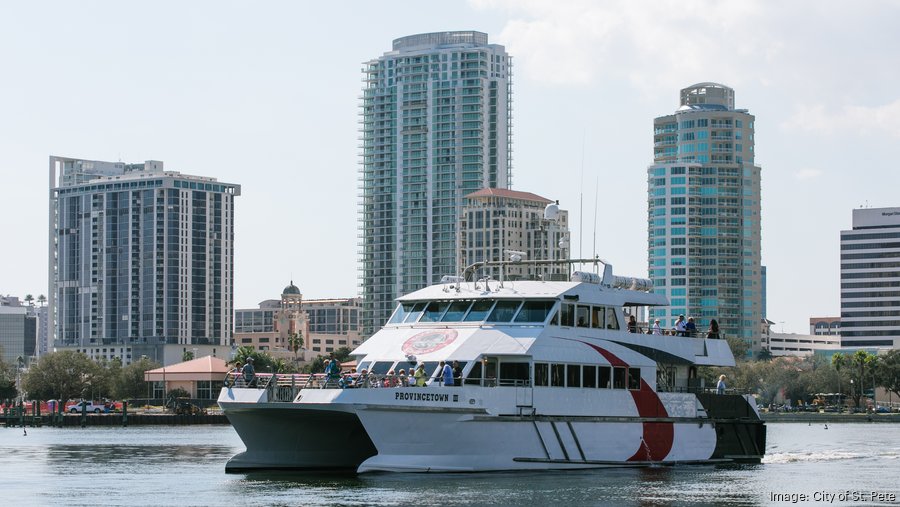
Locals Take the Helm: St. Pete’s Chance to Control Its Own Ferry Future
Share
For years, Tampa Bay residents have imagined what could happen if the water between St. Petersburg and Tampa became more than just a scenic view. After several false starts, that idea might finally become reality. A Madeira Beach company is now preparing to relaunch the ferry service linking both sides of the bay, and this time the leadership is entirely local.
The Pinellas Suncoast Transit Authority (PSTA) has selected Tampa Bay Sea Taxi, based in St. Petersburg and Madeira Beach, to operate the renewed ferry under a new name, the Tampa Bay Ferry. Operations are expected to begin in the fall of 2026, pending board approval later this month.
A Homegrown Operator with Deep Roots

Tampa Bay Sea Taxi is no stranger to the water. The company is part of a family business that has spent more than two decades serving the Gulf. Its affiliate, Hubbard’s Ferry, has long operated routes from Fort De Soto Park to Shell Key and Egmont Key, while Hubbard’s Marina and the Friendly Fisherman Restaurant at John’s Pass Village remain beloved local landmarks.
“They’re a generational Floridian company, and they have the infrastructure,” said Al Burns, PSTA’s director of procurement. He emphasized that the company’s Gulfport fabrication facility gives it a major advantage for vessel maintenance and repair, ensuring operations stay local and responsive instead of relying on out-of-state contractors.
Lower Fares and Year-Round Service
The proposed relaunch promises not just new boats but a new approach. PSTA plans to purchase two ferries using a $4.8 million federal contract while retaining ownership of the vessels. Tampa Bay Sea Taxi will manage daily operations and carry a $10 million liability insurance policy to maintain safety and accountability.
Average fares are expected to be around $7.50 per trip, a significant reduction from the previous $12 ticket, and for the first time the service will operate year-round instead of seasonally. The projected annual operating cost of about $1.7 million is roughly half of what it cost under HMS Ferries, the Boston-based company that previously managed the route.
The End of Outsider Control

Earlier this year, HMS Ferries abruptly withdrew from the program after proposing a slower vessel that would have doubled the travel time from one hour to two. The sudden exit left both Tampa and St. Petersburg without an operator and sparked concern that the project would once again collapse before reaching its potential.
By stepping in, Tampa Bay Sea Taxi brings homegrown oversight back to the bay. For the first time, this vital regional service will be run by a team that understands the waters firsthand—the same waters that fuel the area’s tourism, recreation, and coastal economy.
Building a Broader Water Network
This revival fits within a larger countywide effort to expand water-based transit. Earlier this year, PSTA assumed control of the Clearwater Ferry, increasing its service frequency and reopening the Dunedin dock, which will expand operations beginning October 9th. The process has not been without difficulties. A tragic April crash involving a private vessel left one passenger dead and ten injured aboard the Clearwater Ferry, underscoring the need for strict safety standards and consistent professional management.
Despite the setbacks, PSTA remains confident that a stronger ferry network is key to the region’s growth. “We’re one of the country’s largest metro areas surrounded and defined by a body of water,” said Darden Rice, PSTA’s chief planning officer. “It’s really a no-brainer that we would develop this transit choice for our citizens.”
A City Defined by Water, Reimagined by Locals
Not everyone is convinced the investment is worthwhile. Hillsborough County Commissioner Josh Wostal has questioned whether the ferry’s annual cost of $1.7 million is justified compared to other transit needs, even after the service reached a record of 72,000 riders last season. Still, for many locals, this feels like a long-overdue course correction and a chance for Tampa Bay’s transportation future to finally be shaped and operated by people who live here.
When service returns, passengers will board from a new downtown St. Petersburg dock near the Museum of History, replacing the old launch point near Albert Whitted Airport. The new location anchors the ferry service within the city’s cultural center, connecting residents and visitors directly to St. Pete’s vibrant waterfront district.
Final Decision Coming Soon
The PSTA board will cast its final vote at the end of October to determine whether Tampa Bay Sea Taxi officially receives the contract. If approved, construction and setup could begin in early 2026, paving the way for a full public launch later that year.
For the first time, Tampa Bay’s signature water route may truly belong to the community—operated by locals, built with accountability, and designed to connect our cities through the very waters that define them.
Would you take the new Tampa Bay Ferry once it launches? Or do you think the dream of a true cross-bay connection is still out of reach? Share your thoughts below and tell us where you’d want the ferry to take you first.

